Celebrating Rockwell
With expressions of gratitude, admiration, and awe, the Lafayette community gathered Friday to celebrate the grand opening of the new Rockwell Integrated Sciences Center and thank the generous supporters, visionary faculty, and committed administration who helped bring the state-of-the-art facility to life.
The facility embodies the College’s commitment to the sciences, technology, innovation, and integration of disciplines. Among the more than 450 alumni, parents, community leaders, and friends in attendance, faculty and students were on hand to provide demonstrations and discuss the multiple ways in which their areas of focus have been enhanced by the center and its cutting-edge features.
In addition to the lead gift provided by Trustee Emeritus S. Kent Rockwell ’66, more than 50 individuals, corporations, and foundations have already contributed to the center, which not only has supported the building’s construction but has enhanced teaching and learning in the center in multiple ways.
The Rockwell Center offers a signature space for the biology and computer science departments and the environmental science and environmental studies programs. It also houses the Bradbury Dyer, III ’64 Center for Innovation and Entrepreneurship, the Daniel and Heidi ’91 Hanson Center for Inclusive STEM Education, the Office of Sustainability, and additional space for neuroscience. The $75 million, five-story building is the largest capital project in Lafayette’s history.
Connected to Acopian Engineering Center and adjacent to Hugel Science Center, Rockwell encourages collaboration between students and professors among the three buildings. A café and additional indoor and outdoor study spaces also are available for student and faculty use. The facility is fundamentally changing how Lafayette combines the liberal arts and sciences by providing spaces for interdisciplinary engagement and room for expansion as the College grows.
As one of the lowest-energy use academic laboratory buildings in the country, the Rockwell Center meets the U.S. Green Building Council’s Leadership in Energy and Environmental Design (LEED) Gold Status—one of the highest industry standards for sustainability. The building was designed to reduce energy consumption by 45 percent below the LEED baseline. It sets a new standard for the campus and supports the College’s commitment to serve as a regional and national leader in reducing energy consumption.
The glass, brick, and steel building, offering sweeping views of campus and College Hill, was designed by the Boston-based architectural firm Payette.
The Rockwell dedication honored leadership donors to all areas of the College as the annual Marquis Founders Recognition Event. Many members of Lafayette’s Marquis Society were in attendance. Marquis Society members give annually to enhance all areas of a Lafayette education. In fact, in fiscal year 2019, Marquis Society members contributed more than $20 million in support for the College.
Already a bustling hub of activity for students, the Rockwell Center is showing great promise for the multiple ways in which it will assist Lafayette to achieve its goals of enhancing curricular experiences and further integrating disciplines.
Naming opportunities still exist in the Rockwell Center. For additional information, contact Jennifer Rock, assistant vice president of development and donor engagement, at rockj@lafayette.edu or 610-330-5039.
Here are a few highlights from the festivities. Visit Flickr for the full album of images.
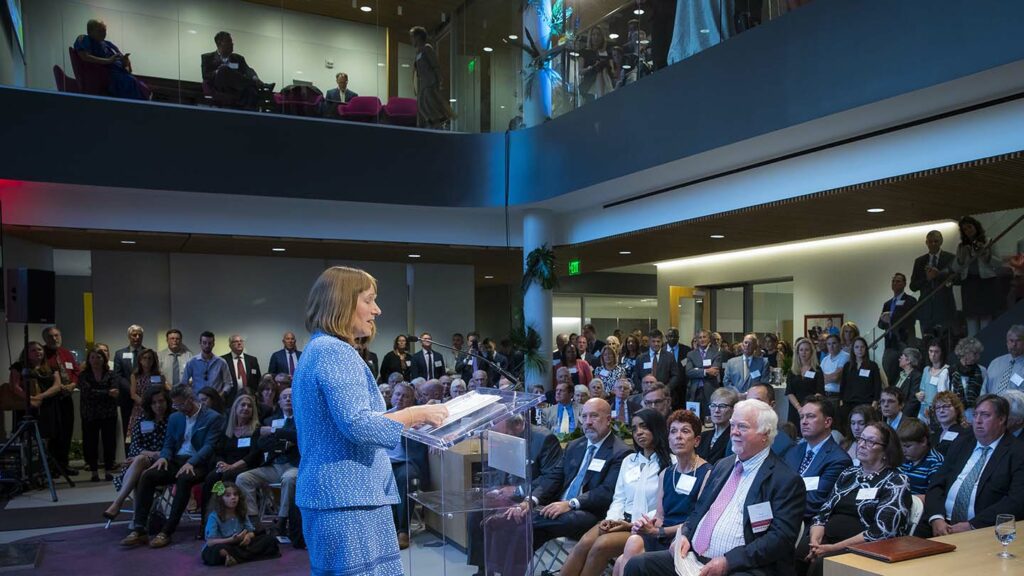
President Alison Byerly opened Friday’s dedication ceremony with reflections about the history of the project. She also shared the immediate impact the Rockwell Center has had on the Lafayette experience. ”I think there is no better symbol for what Lafayette is able to accomplish when we put our minds to it than the building we are standing in right now,” she said. ”We thought about the needs for the sciences, particularly the departments and programs, and we thought about the statement we wanted to make with an academic facility. That ambition grew into the dream you see realized today in this building.”
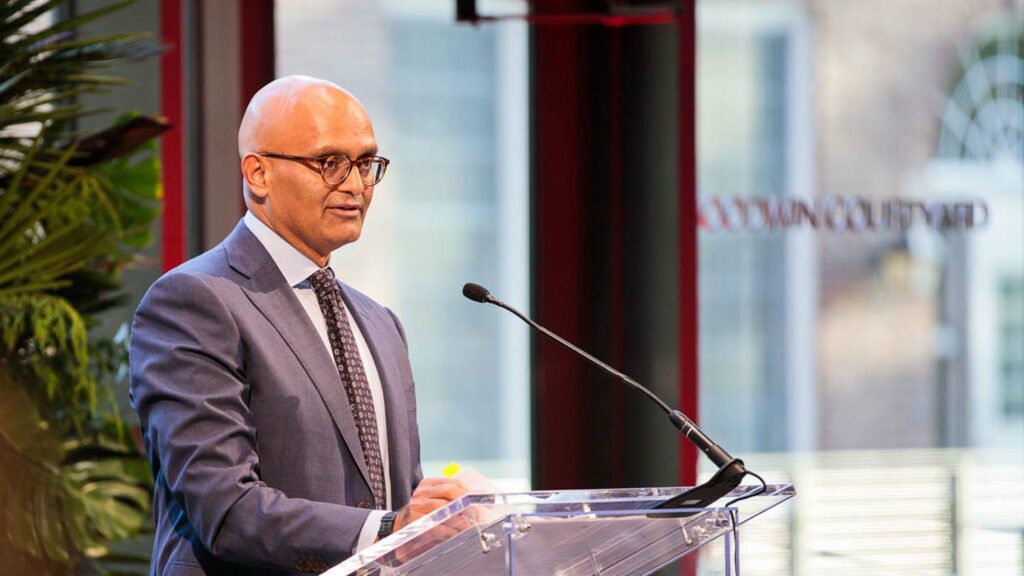
”The students absolutely love this building,” said Abu Rizvi, professor of economics, who served as provost during the planning, design, and construction phases of the new center. ”I was talking to a student just today who said that students have a saying. It’s ‘eat well, sleep well, and Rockwell.’ We went through a lengthy process to arrive at this magnificent result, and it is a terrific outcome. This is the most awesome building the College has built.”
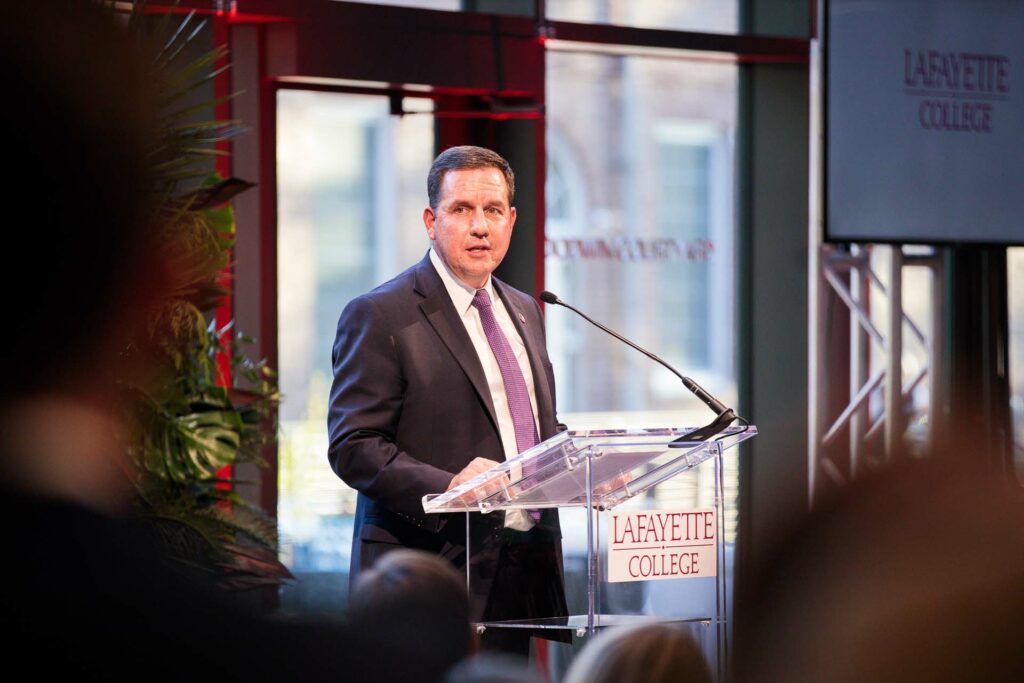
Roger Demareski, vice president for finance and administration, thanked team members who were integral to the ambitious project, including College faculty and administration as well as architecture firm Payette, construction manager Turner, and owner’s representative Aegis Property Group, BR+A Consulting Engineers, Langan Engineering and Environmental Services, Inc., and the Harman Group. He also personally recognized project manager Meghan Madeira ’98, who serves as director of Lafayette’s capital projects. ”All great projects need a great leader, and this project wouldn’t have happened without Meghan Madeira,” he said. ”Meghan’s attention to detail and partnership with our faculty allowed this project to move from concept to reality.”
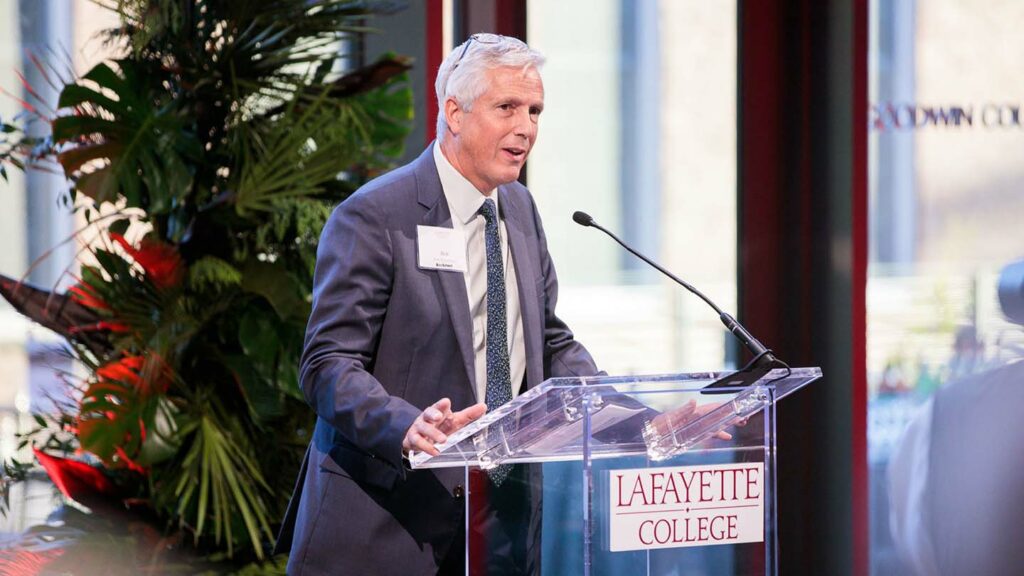
Bob Schaeffner, principal architect at Payette, praised Lafayette administration for its commitment to what he said his team perceived as a challenging—yet exciting—project. ”What you have done here through the Rockwell Center has created a destination, and you’ve done it without giving up on sustainability, which was a priority from the beginning. The College embraced a tough site. There were many problems and many issues. But the College committed to it because you knew it could be done. You did everything that could be done to make it happen. The center has a heart. It has a pulse. There is a hub here that people love to be in. It’s vibrant and meaningful. There are conversations about science happening. It’s all happening here.”
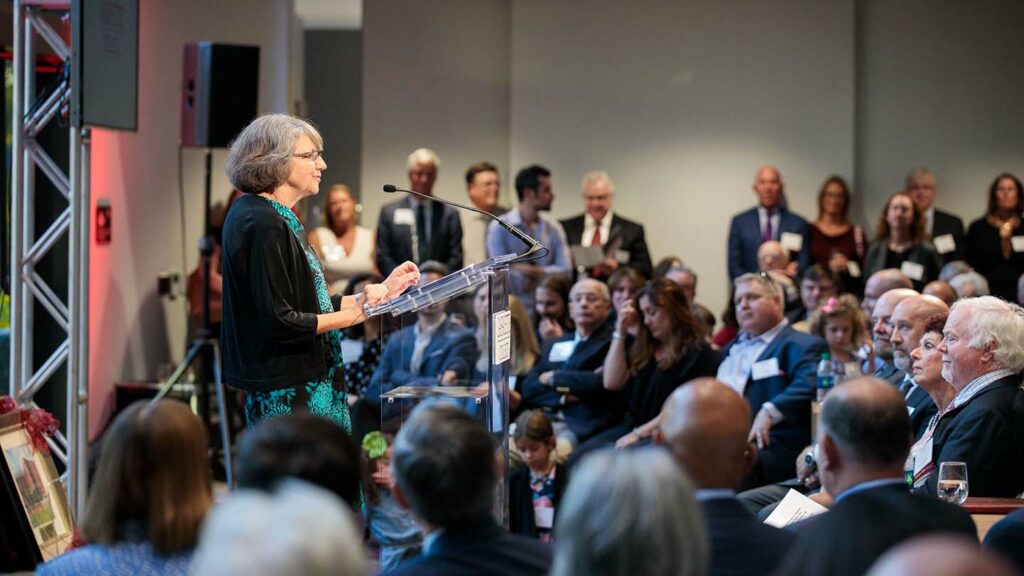
Professor Laurie Caslake, head of biology, shared how the new center has improved the academic experience for students and faculty. ”In our classrooms, the whiteboards afford student engagement with class material in novel ways, and faculty who engage in problem-based learning now have sufficient space to foster team-based student groups. The diversity of informal seating areas and study rooms, with their glass doors, decrease isolation and enable students to build a community of learners. This collaboration space, this building, attests to dreams far beyond our imagining. That will resonate with not only our current students, but those yet to arrive here. For them, thank you.”
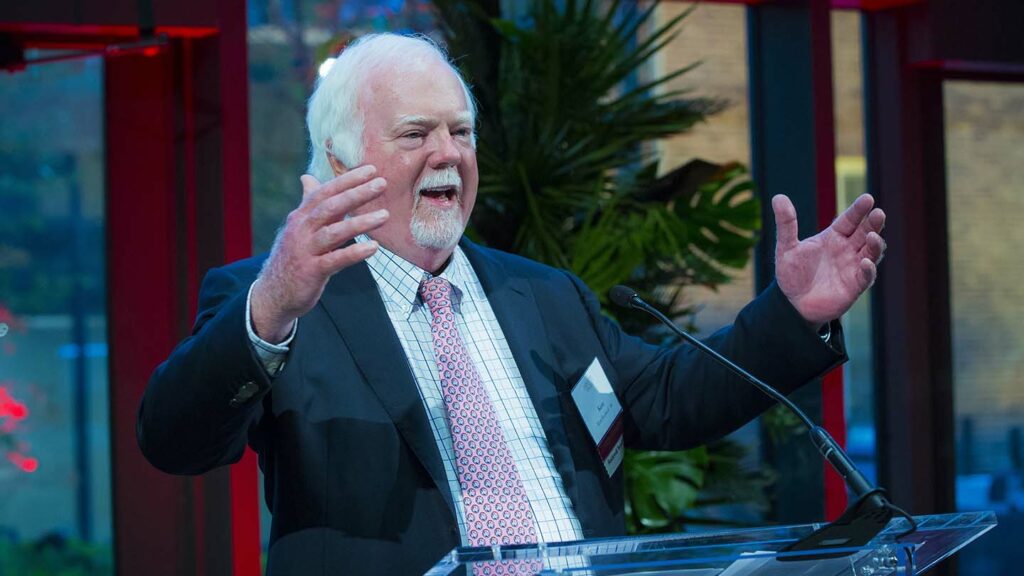
A gift by S. Kent Rockwell ’66, one of the College’s most generous benefactors, and his partner, Patricia Babyak, laid the financial foundation for the facility as part of the Live Connected, Lead Change Campaign, which successfully concluded in December 2018. ”This magnitude of change is transformative in how we deliver education to our students,” he said. ”I think this will allow us to draw high-quality students and faculty and allow us to deliver higher-quality graduates to our society. I’m grateful to the Board of Trustees for their vision in this effort, to the faculty for its inspiration and its guidance, and particularly to the College administration for its effective execution of this project. That teamwork has made this unique and progressive Rockwell Integrated Sciences Center a reality for Lafayette’s campus, and I think we can be quite proud of that.”
![]()
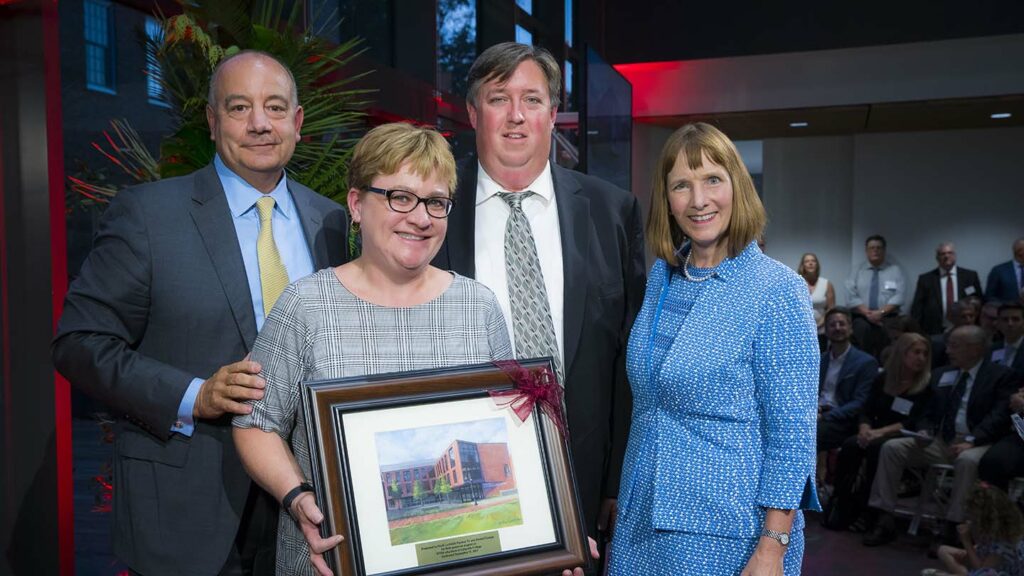
In 2017, Heidi Ludwick Hanson ’91 and her husband, Daniel (center with chair of the Board of Trustees Bob Sell ’84 and President Alison Byerly), committed the lead gift to create the Daniel and Heidi ’91 Hanson Center for Inclusive STEM Education. The Hansons’ gift builds on the couple’s long-standing support of underrepresented students and inclusive excellence. ”It is our hope that the Hanson Center for Inclusive STEM Education offers the resources for Lafayette to welcome students and faculty from all backgrounds into its programs and develop graduates that incorporate inclusiveness as they pursue research and careers that improve our world,” Heidi Hanson said. ”Physically locating the Hanson Center in the Rockwell Integrated Sciences Center further exemplifies opportunities for faculty and students to teach and learn in an environment that fosters inclusivity and interdisciplinarity.” The Hansons also endowed the Daniel and Heidi ’91 Director of STEM Excellence position at the College.
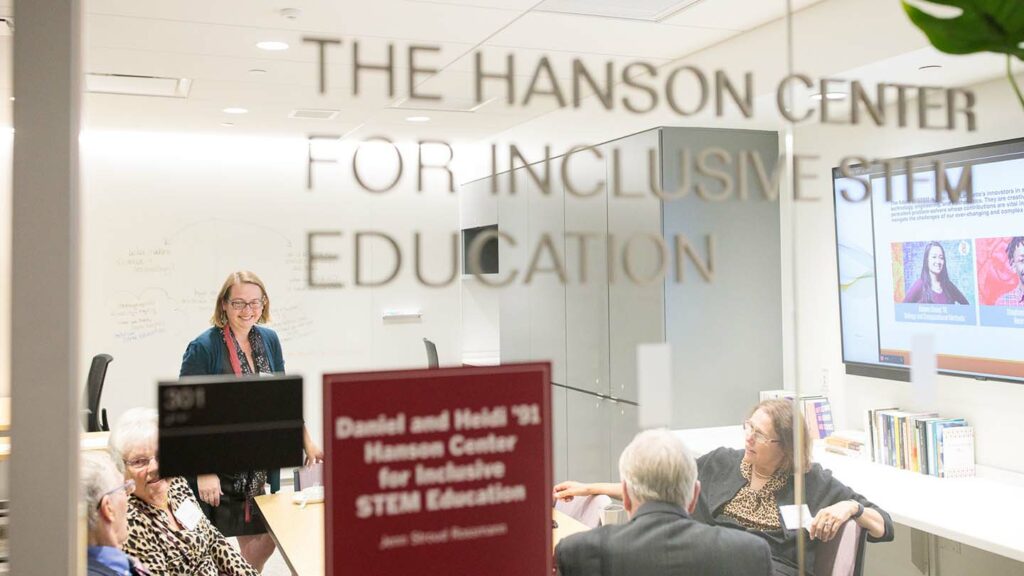
Jenn Stroud Rossmann, professor of mechanical engineering, discusses the role of the Daniel and Heidi Hanson ’91 Center for Inclusive STEM Education to help diverse groups of students understand and contextualize STEM knowledge and foster in them a culture of success.
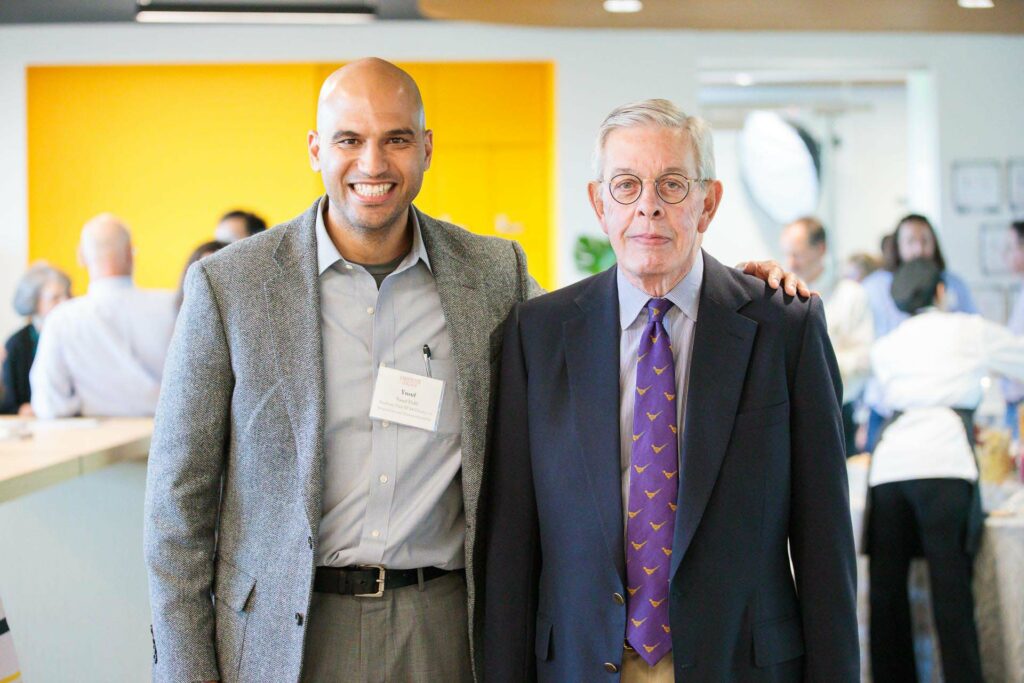
The Bradbury Dyer, III ’64 Center for Innovation and Entrepreneurship is located in the heart of the Rockwell Center for a reason. ”We need to define new methodology for stimulating and advancing innovation in our country,” said Kent Rockwell. “I think the center is established with the objectives to help see these things accomplished.” Yusuf Dahl, Bradbury Dyer, III ’64 Director of the Center for Innovation and Entrepreneurship, has made the new space a dynamic, inviting destination for venturesome students. ”For the Dyer Center to achieve its full potential, we have to build a community around innovation and entrepreneurship,” said Dahl. ”Now we have a dedicated space to foster that community.”
![]()
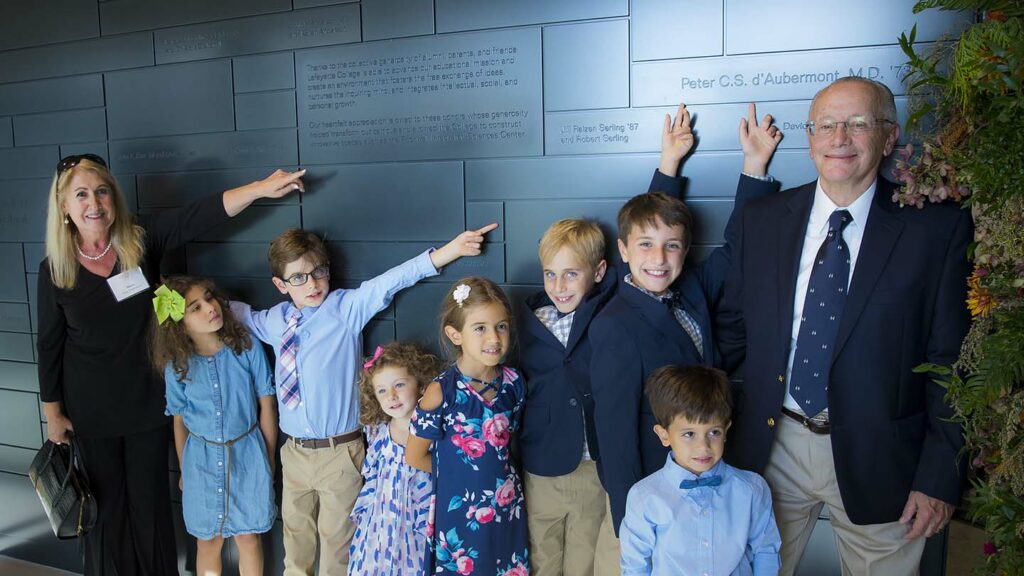
Dr. Peter C.S. d’Aubermont ’73 attended the celebration with his family (some of whom are pictured here). ”I am thrilled to support Lafayette through the creation of a professorship and support the Rockwell Center,” he said. ”My philanthropy honors my mother and Dr. Leo Y. Selesnick, a mentor who was instrumental in my enrollment at the College and subsequent success.” He provided an endowment to establish the Peter C.S. d’Aubermont, M.D., ’73, Scholar of Health and Life Sciences, a position currently held by Khadijah Mitchell, assistant professor of biology. In addition, d’Aubermont funded the d’Aubermont Biology Research Lab on the fifth floor in honor of Selesnick as well as a wing in the center. ”Lafayette opened doors for me as a non-traditional student from Argentina. In addition, I was always fascinated with medicine because we have learned so much over the years, yet so much is unknown. The sciences at Lafayette were very strong when I was a student and will be even stronger now as a result of the Rockwell Integrated Sciences Center.”
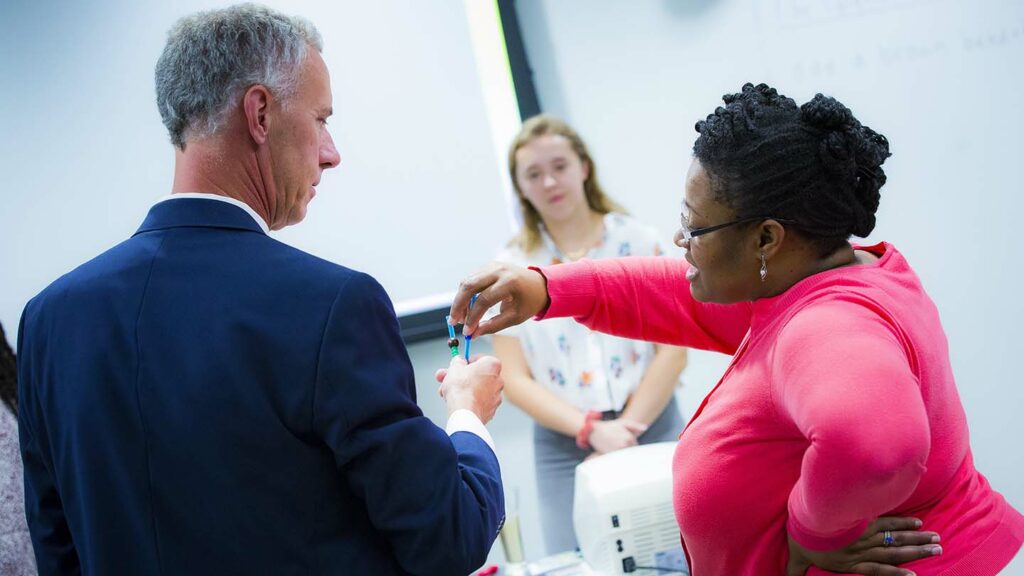
Khadijah Mitchell (right), Peter C.S. d’Aubermont, M.D.,’73, Scholar of Health and Life Sciences and assistant professor of biology, presented a demonstration to help Rockwell visitors understand her work as a human geneticist.
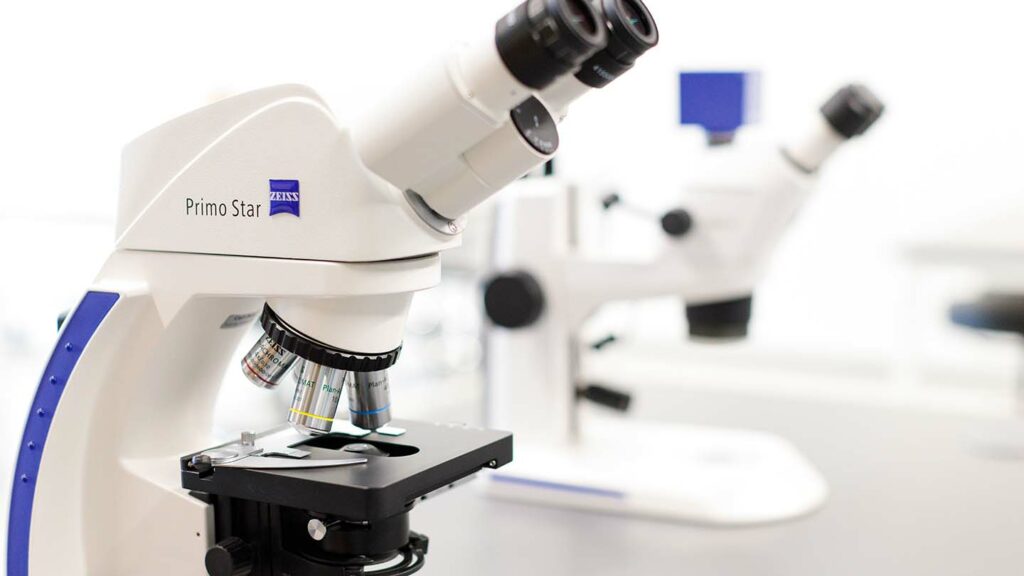
Thanks to advanced technology in the Rockwell Center’s instructional biology labs, Lafayette has the distinction of having the largest digital classroom installation in North America. No other institution of higher education has as many Zeiss networked student microscopes. This technology permits real-time classroom screen displays from each student microscope, which permits the entire class to engage in conversation and reflection. Equipment support was provided by Trustee Emeritus Donald Morel Jr. ’79 P’18, George I. Alden Trust, Julabo USA, Inc., and The McCutchen Foundation.
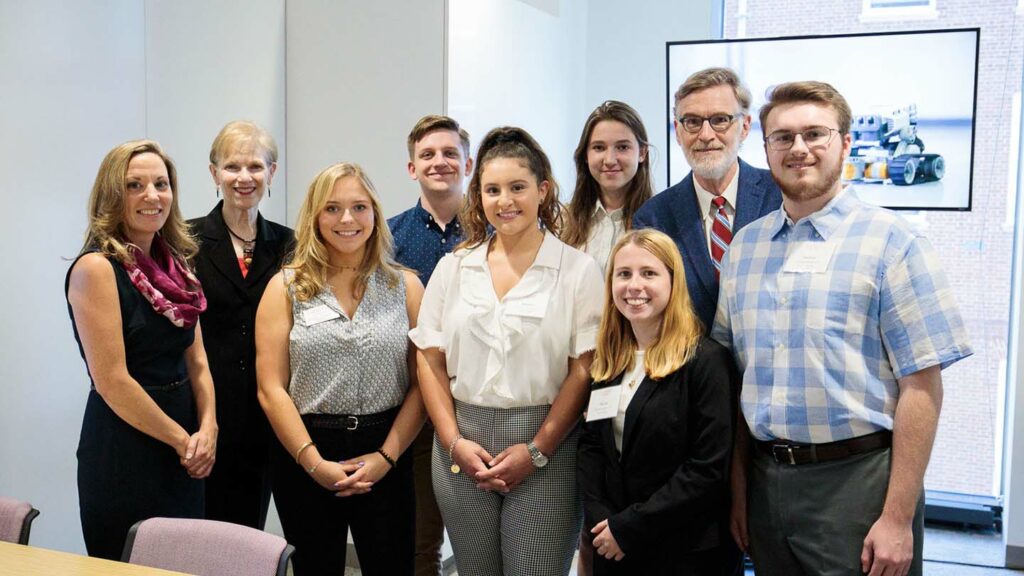
The Dorflinger-Graham Collaborative Neuroscience Space, or CNS (a fitting name as it also stands for central nervous system), is a designated area for neuroscience students to gather and study. It was named by Trustee Emeritus Laneta Dorflinger ’75 H’17 (second from left) and husband Mark Graham II (second from right). The proximity to biology and computer science enhances the interdisciplinary nature of the neuroscience program. Lisa Gabel, program chair for neuroscience and the William C. ’67 and Pamela Rappolt Scholar in Neuroscience (far left), and students showcased their multidisciplinary collaborative research program on a brain-computer interface.
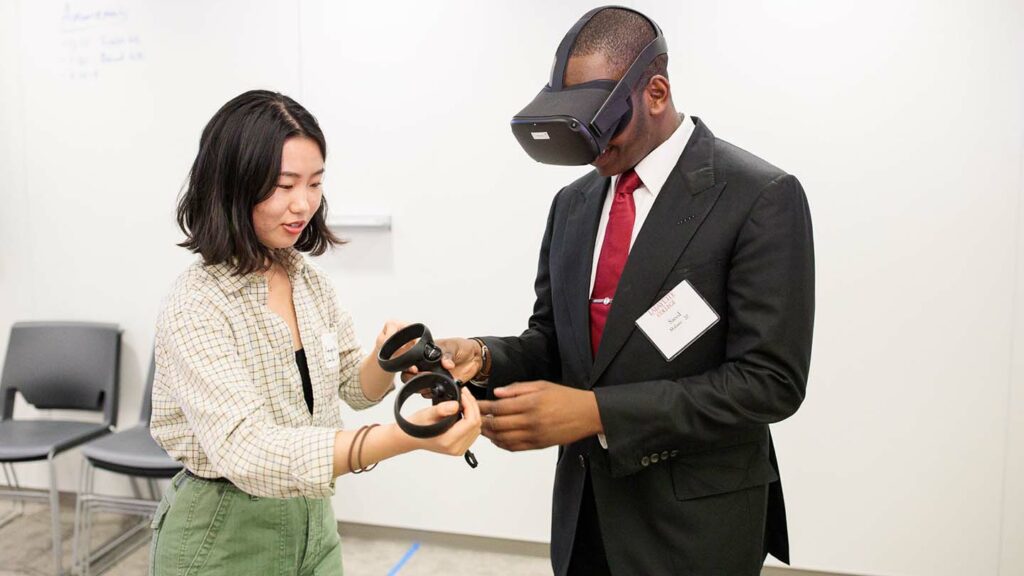
Saeed Malami ’20, a computer science and government & law double major (right), demonstrates the use of virtual reality to enhance educational experiences. ”With VR, you can bring anything to you,” he said. “VR is already here in so many ways, even the apps on your smartphone. It brings the power of personalization to learning.”
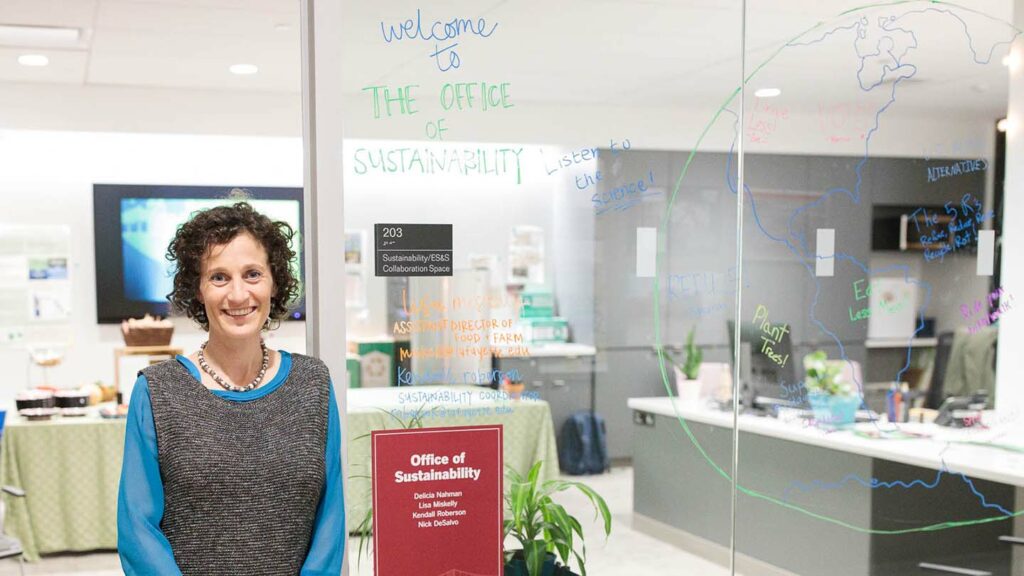
It’s fitting that the Office of Sustainability now calls the Rockwell Center home. The center embodies Lafayette’s commitment to reaching carbon neutrality. The building features an array of energy-saving innovations, including green hoods in labs, daylighting and reduced lighting, and high-performance HVAC with heat recovery. Delicia Nahman, director of sustainability, welcomed guests and provided an overview of the office’s work. ”It’s about creating a more sustainable Lafayette within a center the fosters collaboration and innovation,” she said.
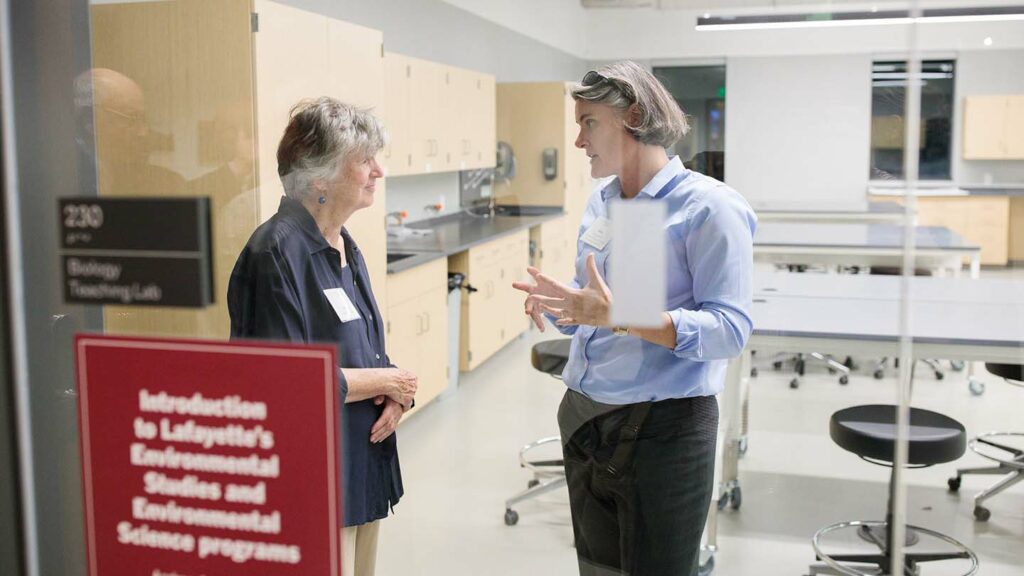
Dru Germanoski, Dr. Ervin R. Van Artsdalen Professor of Geology and program chair for environmental science and environmental studies (ES&ES), called the Rockwell Center a “game-changer” for the program. ES&ES is an interdisciplinary program that collaborates closely with biology and the Office of Sustainability. Here Kira Lawrence (right), professor and head of geology, who teaches in the ES&ES program, discusses the effects of climate change and the need to avoid reaching critical tipping points with Mary Liz Colley P’98. ”Our message to students is to be a participant, not a spectator,” Lawrence said. ”Don’t despair; get in the game.”
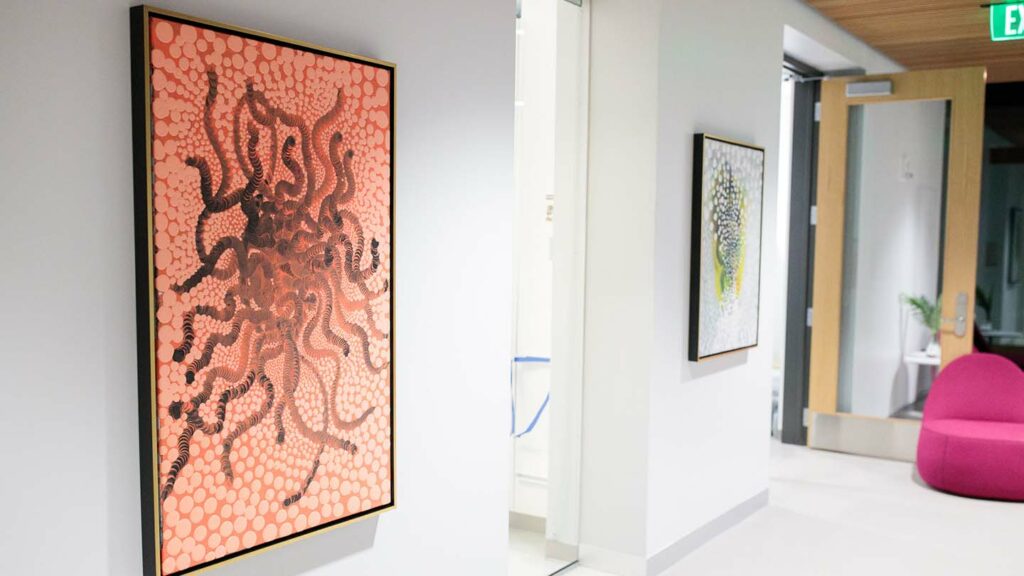
Paintings from Ed Kerns’ Octopus Meditations exhibition are on permanent display in the biology department, which chose the artwork to complement Rockwell’s interdisciplinary environment. Kerns, department head and Eugene H. Clapp II ’36 Professor of Art, was inspired by computer engineer Bernardo Kastrup’s article in Scientific American about levels of consciousness, Sy Montgomery’s book The Soul of an Octopus, and numerous collaborations with neuroscientists and biologists over his 45-year career. ”I think and model subjective experience with paint, and a layered approach is what I use,” Kerns said in a Lafayette news article last year. ”Enter the mimic octopus, which has nine brains in an integrated network situation—a creature that can change shape and color at will. What a treat to contemplate how that might work or look.”
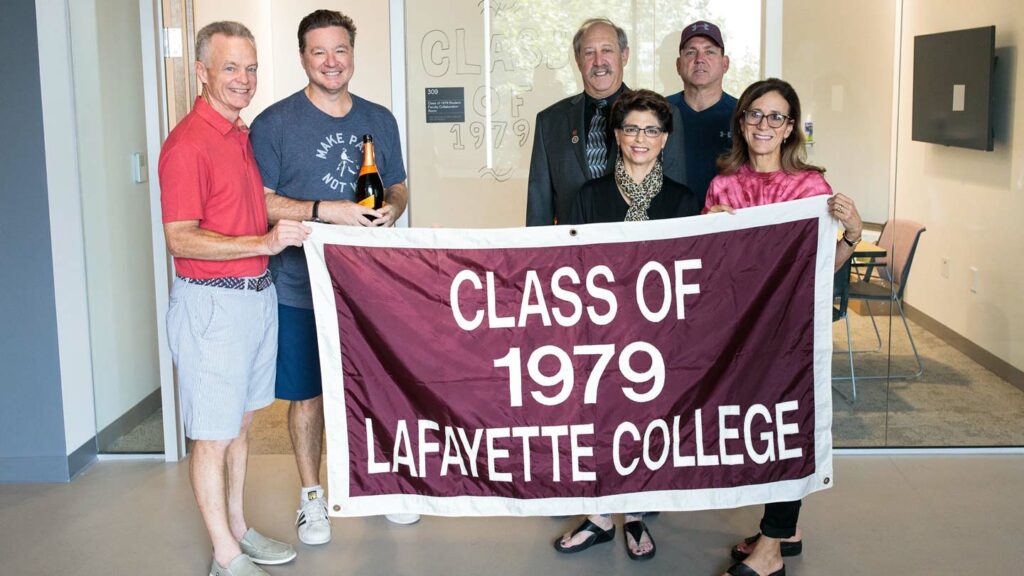
In honor of their 40th reunion, members of the Class of 1979 contributed a gift to name the Class of ’79 Student-Faculty Collaboration Room, located on the third floor of the Rockwell Center. Former Alumni Association President and Trustee Lisa Kassel ’79 and Laurie Samet ’79 represented their classmates at the celebration.
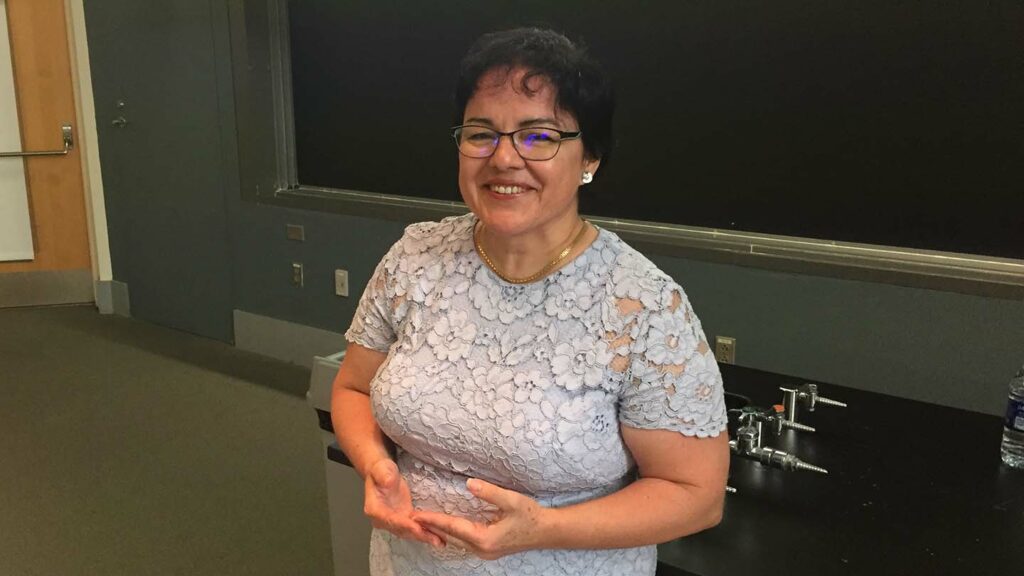
Graciela Gonzalez-Hernandez, associate professor of informatics at University of Pennsylvania’s Perelman School of Medicine, kicked off the dedication celebration with a keynote lecture Sept. 25. Her talk centered on myths, misconceptions, and entrapments of using information shared on social media for health research. She was introduced by President Byerly, who said Gonzalez-Hernandez’s interdisciplinary work in computer science, biology, and linguistics reflects the educational mission at Rockwell.